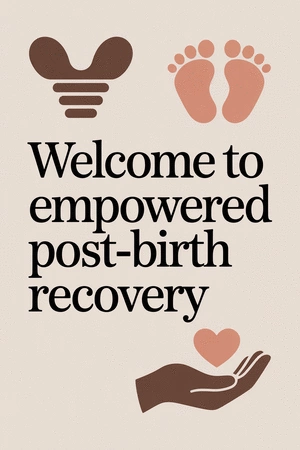As you step into motherhood, the journey of postnatal recovery can often feel overwhelming. Did you know that investing time and resources into your recovery not only benefits you but also nurtures your little one? Understanding the complexities of postnatal recovery is essential for both physical healing and mental wellness.
What You Will Learn
- Postnatal recovery involves holistic care that includes physical healing, mental wellness, and emotional support.
- Understanding the stages of postnatal recovery can help you navigate through physical and emotional adjustments effectively.
- Recognizing hormonal changes post-birth is crucial as they can impact both your physical recovery and emotional state.
- Engaging in pelvic floor rehabilitation and gentle core exercises is essential for regaining strength after childbirth.
- Postpartum depression (PPD) is a significant concern; being aware of its signs can help you seek timely support.
- Nutrition plays a vital role in recovery; focusing on a balanced diet rich in essential nutrients can aid in healing.
- Building a strong support system through therapy, doulas, or peer groups can greatly enhance your mental health during recovery.
- Utilizing online resources and telehealth can provide convenient access to necessary support and information.
- Involving family in your recovery process can create a supportive environment that fosters healing and connection.
Stages of Postnatal Recovery
Understanding the distinct stages of postnatal recovery can help new mothers effectively navigate their journey towards healing. Below is a visual representation of the stages and their focus areas.
Immediate Postpartum
Focus on physical recovery and adjusting to the new role as a mother.
Early Days
Emotional adjustments and bonding with your baby take center stage.
Weeks 4-6
Start incorporating gentle exercises and self-care practices.
Beyond the First Six Weeks
Gradually resume activities focusing on long-term health and wellness.
The Essential Journey of Postnatal Recovery
As a new mother, embarking on the journey of postnatal recovery can feel like navigating through uncharted waters. It's not just about healing physically; it encompasses mental wellness, emotional support, and nutritional guidance. At Empowered Post-Birth Recovery, we understand that every woman's experience is unique, and our aim is to provide you with the comprehensive resources you need during this transformative phase. Let's dive into the essentials of postnatal recovery!
Understanding Postnatal Recovery: An Overview
Postnatal recovery is a crucial period that requires careful attention to various aspects of health. It involves not only the physical healing after childbirth but also the mental and emotional adjustments that come with motherhood. Understanding this journey means recognizing the importance of holistic care that supports your body and mind. Here’s why it matters:
- Promotes physical healing and strength.
- Enhances mental well-being and emotional stability.
- Encourages connection with other mothers for support.
Why Postpartum Care Matters for New Mothers
Postpartum care is essential because it sets the stage for long-term health. As women, we often prioritize everyone else's needs, but it’s vital to *take time for ourselves*. When we invest in our recovery, we not only improve our well-being but also create a nurturing environment for our little ones. Remember, a happy mom leads to a happy baby!
The Stages of Postnatal Recovery
Postnatal recovery can be broken down into several stages, each with its own focus and importance. Understanding these stages can help you navigate your journey with clarity:
- Immediate Postpartum: This phase focuses on physical recovery and adjusting to your new role as a mother.
- Early Days: During this time, emotional adjustments come into play, and attention shifts to bonding with your baby.
- Weeks 4-6: As you begin to regain strength, you'll want to incorporate gentle exercises and self-care practices.
- Beyond the First Six Weeks: This is when you can gradually resume activities and focus on long-term health and wellness.
Hormonal Changes and Their Impact on Recovery
After giving birth, hormonal changes can significantly influence your recovery. From fluctuating emotions to physical challenges, these changes are normal but can feel overwhelming. Recognizing that you're not alone in these feelings is essential. Here are some common hormonal shifts to be aware of:
- Estrogen and Progesterone: Levels drop, which can lead to fatigue and mood swings.
- Oxytocin: This ‘love hormone’ promotes bonding but can also trigger emotional highs and lows.
- Prolactin: Increased levels support lactation but may also contribute to feelings of fatigue.
Physical Recovery After Birth: Key Strategies
Physical recovery is a fundamental aspect of your postnatal journey. At Empowered Post-Birth Recovery, we focus on empowering you with effective strategies that support healing. Here are some key practices to incorporate:
Pelvic Floor Rehabilitation Techniques for Postpartum Healing
Rehabilitating the pelvic floor is crucial after childbirth. Gentle exercises can help strengthen those muscles, enhancing recovery. For comprehensive guidelines on pelvic floor health, the National Institute of Diabetes and Digestive and Kidney Diseases (NIDDK) offers valuable information. Consider these techniques:
- Kegel Exercises: Strengthen pelvic floor muscles.
- Breathing Exercises: Promote relaxation and core strength.
- Physical Therapy: Consult a specialist for tailored guidance.
Diastasis Recti: Understanding and Addressing Core Weakness
Diastasis recti, the separation of abdominal muscles, is common, especially after pregnancy. Addressing it can seem daunting, but it’s very manageable with the right approach. Some effective steps include:
- Gentle Core Exercises: Start with simple movements to engage your core.
- Avoiding Strain: Focus on proper posture and avoid heavy lifting.
- Consultation: Reach out to a physical therapist for personalized advice.
Effective Exercises for Strengthening Core Muscles
Strengthening your core is essential for overall stability and function. Here are some engaging exercises you can try as you recover:
- Bridges: Great for glute and lower back strength.
- Modified Planks: Start on your knees to focus on form.
- Pelvic Tilts: Gentle movements that reconnect you with your core.
Innovative Technologies: Utilizing Telehealth for Physical Therapy
Telehealth is a game-changer for new mothers seeking physical therapy. It offers convenience and personalized care right from your home! Here’s why you should consider it:
- Accessibility: Get help when you need it, without the hassle of travel.
- Personalized Plans: Work with therapists who understand your specific needs.
- Comfort: Participate in sessions from the comfort of your home.
Yoga for Recovery: Enhancing Mobility and Relaxation
Incorporating yoga into your postnatal routine can foster both physical healing and emotional grounding. Here’s how it helps:
- Improves Flexibility: Gentle stretches can help restore mobility.
- Promotes Relaxation: Mindfulness techniques enhance your mental health.
- Builds Strength: Many yoga poses focus on core stability.
Navigating Mental Health in Postpartum Life
The mental health aspect of postnatal recovery is just as important as physical healing. Many new mothers experience a range of emotions, and understanding these feelings can be empowering. Let’s explore some essential points.
Understanding Postpartum Depression: Signs and Symptoms
Postpartum depression (PPD) is a condition that affects many new mothers. Recognizing the signs is crucial for seeking help. For more detailed information on PPD, including symptoms and treatment options, the National Institute of Mental Health (NIMH) provides reliable resources. Some common symptoms include:
- Persistent Sadness: Feeling overwhelmed or hopeless.
- Loss of Interest: Not enjoying activities you once loved.
- Social Withdrawal: Avoiding friends and family.
The Baby Blues: Differences and Support Strategies
The baby blues are different from PPD, though they may feel similar. Here’s how to differentiate and address them:
- Temporary Feelings: Baby blues usually resolve within a few days to two weeks.
- Support: Lean on family and friends during this time.
- Self-Care: Prioritize rest and nourishment.
Support Systems: The Role of Therapists and Doulas
Establishing a strong support system is vital for your mental health. Here’s how to build one:
- Therapists: Seek professional help if needed.
- Doulas: They can provide emotional and physical support.
- Peer Support: Connect with other mothers for shared experiences.
Self-Care Practices: Mindfulness and Stress Management Techniques
Making time for self-care can greatly enhance your recovery. Here are some simple practices:
- Mindfulness Meditation: Just a few minutes can help clear your mind.
- Breathing Exercises: Deep breaths can reduce stress.
- Gentle Movement: Short walks can boost your mood.
Nutrition’s Role in Postnatal Recovery
Your body needs the right fuel to heal and regain energy. Paying attention to nutrition is key during this time. Here are some essential points to consider:
Essential Nutrients for Healing and Energy Restoration
Incorporating specific nutrients into your diet can significantly aid your recovery. Focus on these:
- Protein: Important for tissue repair.
- Calcium and Vitamin D: Essential for bone health.
- Iron: Helps combat fatigue and rebuild blood levels.
Nutritional Support: Meal Planning for New Mothers
Meal planning can take the stress out of cooking while ensuring you eat well. Here are some tips:
- Batch Cooking: Prepare large portions and freeze for later.
- Simple Recipes: Focus on easy-to-make meals that are nutritious.
- Healthy Snacks: Keep quick, healthy options available.
Cost-Effective Homemade Remedies for Postpartum Recovery
Homemade remedies can be budget-friendly and effective. Consider these options:
- Broths and Soups: Rich in nutrients and easy on digestion.
- Herbal Teas: Can promote relaxation and healing.
- Smoothies: A quick way to get essential vitamins!
Lactation Support: Ensuring Successful Breastfeeding
Breastfeeding can be both rewarding and challenging. Providing the right support is essential for success. Here’s what you need to know:
Guidance from Lactation Consultants: What to Expect
Lactation consultants can be invaluable resources as you navigate breastfeeding. Here’s how they can help:
- Personalized Advice: Tailored strategies based on your experience.
- Techniques: Help with proper latch and positioning.
- Addressing Concerns: Discuss any challenges openly.
Addressing Common Challenges in Breastfeeding
Many mothers face challenges in breastfeeding, but knowing how to tackle them can ease frustration. Here are some common issues and solutions:
- Sore Nipples: Use nipple creams and ensure a proper latch.
- Low Milk Supply: Consult with a lactation expert for tips.
- Engorgement: Hand express or use a pump to relieve pressure.
Breastfeeding Support Groups: Connecting with Other Mothers
Joining a breastfeeding support group can provide encouragement and camaraderie. Here’s why it’s beneficial:
- Shared Experiences: Learn from other mothers' journeys.
- Emotional Support: Build friendships with women who understand your struggles.
- Resource Sharing: Gain access to valuable information and tips.
Engagement Strategies for New Mothers
Engaging with others can make your postnatal experience more fulfilling. Here are some strategies to foster support and connection:
Interactive Tools: Quizzes to Assess Recovery Needs
Utilizing quizzes can help identify your recovery needs and guide you toward the right resources. These tools can make the process more interactive and fun!
Sharing Personal Stories: Building a Community for Support
Sharing your experiences, both the challenges and triumphs, can create a sense of community. Connecting with others fosters understanding and support. It’s all about lifting each other up!
Online Resources and Forums for Ongoing Education
The internet is full of resources that can aid your recovery. Here are some options to explore:
- Webinars: Attend sessions on various postnatal topics.
- Online Forums: Join discussions with fellow new mothers.
- Social Media Groups: Connect and share experiences in dedicated communities.
Pro Tip
As you navigate the various stages of postnatal recovery, consider setting aside a few moments each day for mindfulness practices. Simple techniques such as deep breathing or guided meditation can significantly improve your mental clarity and emotional resilience. These moments of calm can provide you with the strength needed to tackle the challenges of motherhood and support your overall healing journey.
Bringing It All Together: Your Postnatal Recovery Pathway
As a new mother, you may find yourself on a unique journey of healing and self-discovery. At Empowered Post-Birth Recovery, we believe that understanding the essentials of your postnatal recovery pathway is crucial. So, let’s summarize the key insights that can guide you toward effective healing in this transformative phase of life!
First and foremost, don’t underestimate the importance of personalized care. Each woman’s journey is different, and what works for one may not be the answer for another. Tailoring your postnatal recovery plan to fit your specific needs will make a world of difference. Remember, you deserve a recovery experience that respects your unique journey!
Summarizing Key Insights for Effective Recovery
So, what are some key insights to keep in mind? Here’s a straightforward list to help you navigate your postnatal recovery:
- Know Your Body: Understanding the changes your body has gone through is essential.
- Seek Support: Don’t hesitate to reach out to professionals, friends, and family.
- Be Kind to Yourself: Recovery is a process; give yourself grace as you heal.
- Nutrition Matters: Focus on nourishing meals to support your healing journey.
- Stay Active: Gentle exercises can help improve your physical and mental well-being.
Additionally, always keep in mind that utilizing available resources is vital. Whether it’s connecting with lactation consultants, joining support groups, or exploring online forums, these resources are here to guide you. I often remind my clients that asking for help is not a sign of weakness; it's a step towards empowerment!
The Importance of Personalized Care in Postnatal Recovery
At Empowered Post-Birth Recovery, I focus on offering personalized care tailored to each mother’s journey. This means recognizing that no two experiences are alike. By evaluating your specific needs—be it physical rehabilitation, mental wellness, or nutritional support—you can create a more effective recovery plan that resonates with you.
Incorporating personal care strategies can help you rebuild strength and confidence. Think of it as a roadmap that considers your unique circumstances, from the type of birth you had to any underlying health conditions. Tailoring your journey empowers you to take charge of your recovery!
How to Utilize Available Resources for Optimal Healing
When it comes to recovery, leveraging available resources is key. Here are some ways to make the most out of what’s out there:
- Join a Support Group: Connecting with other mothers can provide emotional support.
- Consult with Professionals: Reach out to physical therapists, nutritionists, and mental health experts.
- Explore Online Forums: Engage in discussions and find shared experiences that resonate with your journey.
- Utilize Telehealth Services: Accessing healthcare from home can provide comfort during recovery.
By utilizing these resources, you can create a more supportive environment that encourages healing. It’s like having a safety net that ensures you have the tools you need at your fingertips!
Advocacy for Maternal Health: Understanding Your Rights
Another important aspect of your postnatal journey is advocating for your health. Understanding your rights as a new mother is paramount. Know that you deserve quality care, whether that’s during your hospital stay or in the months that follow. Don't shy away from asking questions or expressing concerns; your health and well-being should always come first!
Being informed about your rights empowers you to navigate the healthcare system confidently. This could mean asking for second opinions or exploring alternative therapies. Remember, your voice matters in creating a recovery experience that feels right for you!
FAQs About Postnatal Recovery
- What is postnatal recovery?
- Postnatal recovery is the period after childbirth where a mother's body heals and adjusts to the physical, mental, and emotional changes of motherhood. It involves holistic care to support overall well-being.
- What are the main stages of postnatal recovery?
- The main stages include Immediate Postpartum (focused on physical healing), Early Days (emotional adjustments and bonding), Weeks 4-6 (gentle exercises and self-care), and Beyond the First Six Weeks (gradual return to activities and long-term wellness).
- How do hormonal changes affect postnatal recovery?
- Hormonal shifts, such as drops in estrogen and progesterone, can lead to fatigue and mood swings. Increased oxytocin and prolactin levels, while essential for bonding and lactation, can also contribute to emotional fluctuations and fatigue.
- What is postpartum depression (PPD) and how does it differ from baby blues?
- Postpartum depression (PPD) is a more severe and persistent condition characterized by prolonged sadness, loss of interest, and social withdrawal. "Baby blues" are temporary feelings of sadness and anxiety that typically resolve within a few days to two weeks after birth.
- Why is pelvic floor rehabilitation important after childbirth?
- Pelvic floor rehabilitation is crucial to strengthen muscles weakened during childbirth, which helps prevent issues like incontinence and supports overall core stability. Techniques like Kegel exercises and physical therapy are often recommended.
- What role does nutrition play in postnatal recovery?
- Nutrition is vital for healing and energy restoration. A balanced diet rich in protein for tissue repair, calcium and vitamin D for bone health, and iron to combat fatigue is essential for new mothers.
- How can telehealth benefit postnatal physical therapy?
- Telehealth offers convenient and personalized physical therapy sessions from home, making it accessible for new mothers who may find it challenging to travel. It allows for tailored plans and professional guidance without the hassle.
- What kind of support systems are beneficial for new mothers?
- Beneficial support systems include therapists for mental health concerns, doulas for emotional and physical support, peer groups for shared experiences, and involving family members to create a nurturing environment.
Encouragement to Seek Support and Advice
As you move forward on your postnatal recovery journey, always remember: seeking support is not only beneficial; it’s essential! And it’s okay to ask for help when you need it. Trust me, every mother has been there, and it’s perfectly normal to feel overwhelmed. You’re not alone in this journey!
Recognizing When to Consult Professionals
Knowing when to seek professional help can make a significant difference in your recovery. Here are some signs that may indicate it’s time to reach out:
- Persistent Pain: If you're experiencing ongoing pain that doesn't improve.
- Emotional Distress: If feelings of sadness or anxiety persist, consider talking to a therapist.
- Feeding Challenges: Struggling with breastfeeding? A lactation consultant can help.
- Physical Limitations: Difficulty with everyday activities could signal the need for physical therapy.
Taking action when needed can help you avoid unnecessary setbacks. Remember, reaching out is a sign of strength!
Continuing the Conversation: Engaging with Fellow Mothers
One of the most rewarding aspects of your recovery journey can be connecting with fellow mothers. Sharing experiences and insights can be incredibly powerful. Whether it’s through online forums, local support groups, or even social media, finding your tribe can provide a sense of belonging and understanding.
Engagement with others not only supports you emotionally but also offers practical advice and encouragement. You might discover new strategies that work well for you or even hear stories that resonate with your own journey. It's all about creating a supportive community that uplifts and empowers!
Exploring Family Support Options for Enhanced Recovery
Don’t forget about the support your family can offer during this time. Involve them in your recovery by communicating your needs and preferences. Whether it’s asking for help with household tasks or simply needing someone to listen, having a supportive family can ease your journey.
Here are some ways to engage your family in your recovery:
- Set Clear Expectations: Let them know how they can help.
- Share Your Goals: Discuss your recovery goals, so they can support you better.
- Encourage Participation: Invite family members to join in on light exercises or activities.
Remember, involving your family creates a supportive atmosphere that can significantly enhance your healing experience!
Recap of Key Points
Here is a quick recap of the important points discussed in the article:
- Holistic Approach: Postnatal recovery encompasses physical, mental, and emotional healing.
- Support Systems: Engaging with therapists, doulas, and support groups is vital for recovery.
- Personalized Care: Tailoring your recovery plan to your unique needs will enhance your healing journey.
- Nutritional Focus: Prioritize nourishing meals rich in essential nutrients for recovery.
- Gentle Exercise: Incorporating light exercises can improve both physical strength and mental well-being.
- Advocacy: Understand your rights as a mother and advocate for quality care during your recovery.







